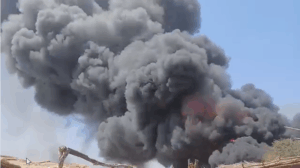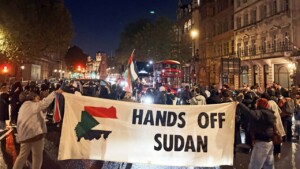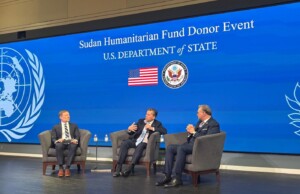Darfur displaced must share food in Kalma
(UPDATE 16:09) The World Food Programme commented that it reaches out with “life-saving food assistance” to newly displaced people in Kalma camp, where residents are reportedly in urgent need of food aid. They have to share their food rations with other displaced families living in the camp.
Approximately 41,000 of the displaced people living in Kalma camp in 2013, 2014, and 2015 have not received food ration cards from the humanitarian organisations in the camp, in spite of being registered with the organisations, the spokesman for the Darfur Displaced and Refugees Association reported.
The Darfur Displaced and Refugees Association reported that camp residents are in urgent need of food aid because they have to share their food rations with newly displaced people in Kalma camp, South Darfur. The World Food Programme said that it reaches out with “life-saving food assistance” to these newly displaced.
Approximately 41,000 of the displaced people living in Kalma camp in 2013, 2014, and 2015 have not received food ration cards from the humanitarian organisations in the camp, in spite of being registered with the organisations, the spokesman for the Darfur Displaced and Refugees Association reported.
Hussein Abu Sharati added that Darfuris who were displaced by conflict more than two years ago also suffer because they share their food with people who do not have enough food. “They are also unable to go out to work or collect firewood, straw or charcoal, in fear of attacks by pro-government militiamen.”
Kalma camp, near the state capital Nyala, hosts more than 163,000 people and is the largest camp in South Darfur. The camp’s general coordinator told Radio Dabanga in July that children in the camp “show signs of malnutrition”, pointing to a halt on food rations.
'Ration cards are no precondition'
In a comment to Radio Dabanga on Thursday, the WFP stated that it is not aware of the reported worsening food situation in Kalma that has resulted from the non-issuance of ration cards. “WFP is assisting 41,000 who were displaced in 2013-2014 who have been verified and registered but have not been given ration cards. Thus it may be noted that issuance of ration cards is not a precondition for provision of food assistance,” spokesman Amor Almagro said. The 41,000 displaced people in Kalma have been verified and registered as in need of food assistance.
“All told, WFP is assisting 87,000 internally displaced people who have been there since 2004 and possess ration cards.”
The programme's food distribution was temporarily stopped in May, when negotiations with camp leaders got delayed. “As soon as we reached consensus with camp leaders in Kalma on how we should proceed with the [vulnerability] assessment, we resumed provision of food assistance completely,” Almagro commented. She explained that vulnerability assessments in camps in Darfur are a necessary tool to determine the type of response the WFP needs to provide to the displaced people.
Appeal to aid organisations
Association's spokesman Abu Sharati, however, called on humanitarian and human rights organisations, the UN, the AU, and the WFP in particular to speed up delivery and provision of aid to the displaced people in the camps. “Put pressure on the donors and the aid organisations,” he called on activists in Sudan and abroad.
Up to 223,000 people in Darfur have been displaced from their homes by conflict since January this year. 104,000 of these people have received some form of humanitarian assistance, the UN Office for the Coordination of Humanitarian Affairs (OCHA) reported in its humanitarian snapshot last week.
At the end of 2014, approximately 3.1 million people in Sudan were internally displaced; 2.5 million of them in Darfur.











 and then
and then